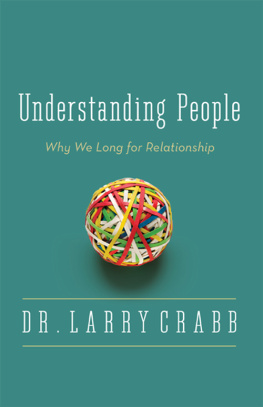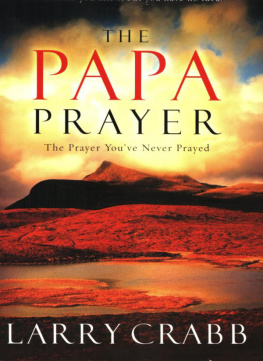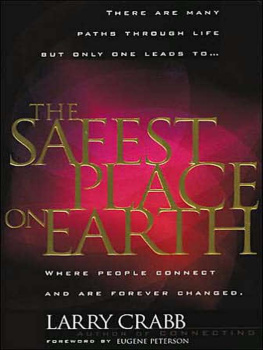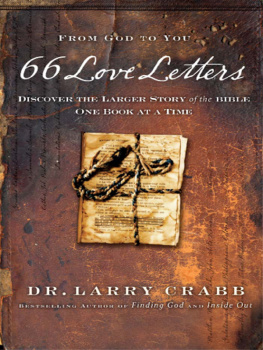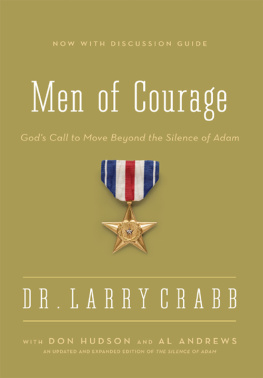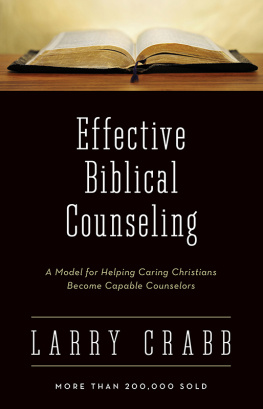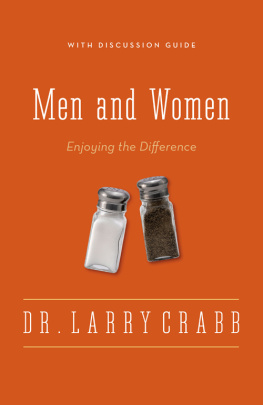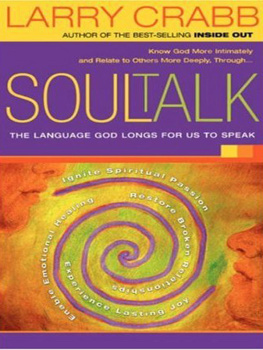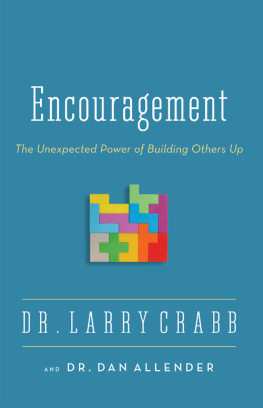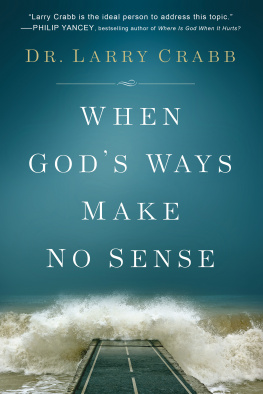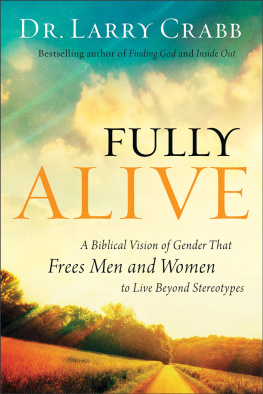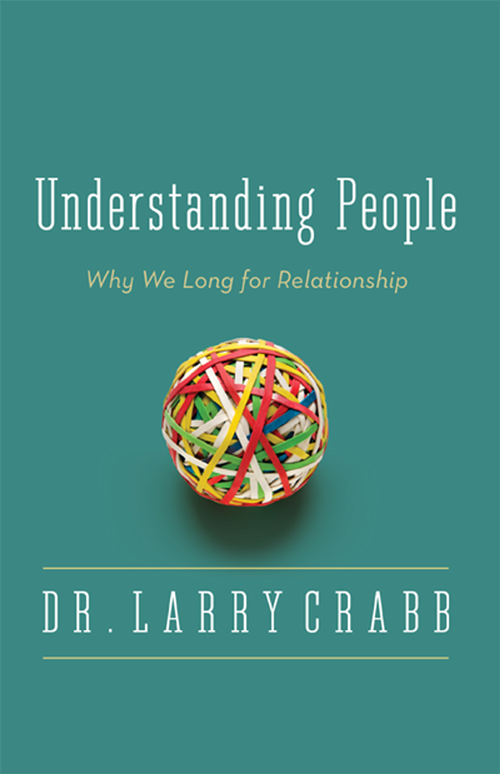DR. LARRY CRABB
F or some years now I have devoted considerable effort to thinking through the subject of biblical counseling. At least one conclusion seems clearly warranted: the ground to be covered includes an almost limitless assortment of thorny questions, each with the potential for creating division. And where the potential exists, the reality is not far behind.
Consider a few of the questions. First, what does it mean to claim that a particular approach to counseling is biblical? Certainly no evangelical would advertise that his or her ideas are unbiblical. Yet it seems that everyone who has taken a position on counseling has been criticized by someone else for being unbiblical. Christian counselors devote a good deal of their writing and lecturing to denouncing other Christian counselors as unbiblical in their views, or at least not as biblical as themselves.
Exactly how are we to measure whether a given counseling position qualifies to be called biblical? I recall one theologian suggesting that a training program in counseling would be biblical if it included a certain minimum of theology and English Bible courses. Behind his suggestion is the idea that counseling itself is abiblical, a discipline quite separate from biblical/theological matters, but that surrounding counseling theory with enough seminary-level courses would lift it to the status of biblical. All of us within theologically conservative circles want to be biblical, but what is it that makes one approach biblical (or more biblical) and another unbiblical (or less biblical)?
Reflect on a second set of perplexing questions. How are we to understand the relationship between biblical study and psychological inquiry? Is a degree in theology irrelevant to becoming a good biblical counselor or is it essential? Or simply helpful? Should Christians aspiring toward the ministry of biblical counseling study secular psychology? Will it corrupt their thinking or expand it? Is it better to examine secular theory under the teaching of secular professors, or should secular theory only be critiqued with the help of Christian professors committed to biblical authority? Or perhaps, if the Bible really is sufficient to answer every question about counseling, secular theory should be ignored altogether. Over the years, I have routinely received letters asking whether I would recommend enrolling in a secular or a Christian school to study counseling. What answer should I give?
Is a thorough grounding in Scripture sufficient to equip someone as an effective counselor? Or is further practical training required, both in the application of the Bible and the method of application? What credentials or training or experience would you look for in deciding where to send your anorexic daughter or your depressed father for help?
Third, how should spiritual leaders in the church and trained counselors in their professional world work together to help people become emotionally whole and relationally effective? Mark McMinn, professor of psychology at George Fox University, continues to argue for a collaborative relationship between counselors and the church, where the resources of wisdom and availability are pooled to best help the most people. Under Tim Clinton, the American Association of Christian Counselors equips licensed counselors to do their work either through the church or in professional settings. Less focus is given to encouraging church leaders to form entire congregations into healing communities. Is spiritual maturity by itself sufficient to qualify someone to help others with problems such as sexual addiction, eating disorders, borderline personalities, and panic attacks? Is that the naive position held by Christian idealists and properly panned by thoughtful realists?
How about Larry Crabb? Does he really believe what his more recent books suggest, that soul talk can connect people into a true spiritual community that takes the pressure off people and releases gospel power into their lives? Can well-meaning Christians be equipped to have conversations that matter, conversations that can better achieve what we wrongly assume can only happen in therapy?
Fourth, what should we do with the tired but still live issue of self-esteem? Must we love ourselves before we can love others? Or is self-love nothing more than sinful self-obsession? Look beneath all the current thinking in Christian circles about how people change and you will see lined up on one side of a deep valley a large group who warmly exhort us to love ourselves as a necessary precondition for loving others. Love others as you love yourself is their key text, interpreted to teach that self-love must be developed before other-love is possible. The core problem behind surface troubles is understood to be low self-acceptance, which, in some peoples minds, is really the essence of sin. Counseling efforts must therefore be directed toward helping people to accept themselves more completely.
There is another group who think that people are already too concerned with themselves and that efforts to build self-esteem aggravate the problem. The real problem is not unfulfilled longings, these folks claim, it is depravity. Sin has so blinded the hearts and minds of people that only truth from the Bible can bring the needed light. Study of Gods Word therefore is a priority.
Counselors of this persuasion are regarded by self-love advocates as harshly insensitive to deep human needs, so caught up in their cold, stiff, exegetical position that they miss the warm truth of Gods affirming love that throbs through the entire message of Scripture.
The Stiff Exegetes, huddled together across the valley from the Self-Lovers, suspect that self-worth is the enemys Trojan horse, a ploy designed to bring within the walls of the city of God a godless humanism dressed up in Christian-sounding language. Their chief concern seems to be that a human-centered distortion of the gospel is hiding within any teaching that gives place to a concern for self-worth. Accordingly, they strongly disclaim and oppose such teaching, believing that they are contending earnestly for the once-delivered faith. They tend to regard self-love advocates as a mixed multitude some sincere believers who want to be biblical, others holding to frankly liberal or at least neoorthodox theology, but all deceived, wrong, and potentially dangerous.
I find myself in clear alignment with neither group. The Self-Lovers seem to reduce sin to something less heinous than arrogant rebellion and foolish self-sufficiency, and they therefore propose a remedy too mild to deal with the real problem. Providing conditions for growth is inappropriate treatment when a fast-growing malignancy is the problem.
The Stiff Exegetes, on the other hand, unwittingly allow a proper concern for precise interpretation of the Bible to rob the text of its relational and life-changing vitality. In order to maintain a nonrelational, impersonal understanding of the Bible, they must neglect many passages that underline the importance of community and intimacy. Their approach often produces people who excel more in scholarship and theological rigidity than in love, nondefensive living, and chosen holiness. They would insist that proper exegesis of the Word never separates doctrine from practice, that the Word understood, proclaimed, and obeyed is itself sufficient to change lives. But somehow God becomes separated from his Word, and time spent in the Word doesnt quite get us to the Person who breathed the words we study.

